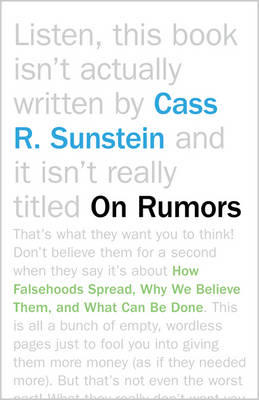
On Rumors
How Falsehoods Spread, Why We Believe Them, and What Can Be Done
Seiten
2014
Princeton University Press (Verlag)
978-0-691-16250-8 (ISBN)
Princeton University Press (Verlag)
978-0-691-16250-8 (ISBN)
Uses examples from the real world and from behavioral studies to explain why certain rumors spread like wildfire, what their consequences are, and what we can do to avoid being misled.
Many of us are being misled. Claiming to know dark secrets about public officials, hidden causes of the current economic situation, and nefarious plans and plots, those who spread rumors know precisely what they are doing. And in the era of social media and the Internet, they know a lot about how to manipulate the mechanics of false rumors--social cascades, group polarization, and biased assimilation. They also know that the presumed correctives--publishing balanced information, issuing corrections, and trusting the marketplace of ideas--do not always work. All of us are vulnerable. In On Rumors, Cass Sunstein uses examples from the real world and from behavioral studies to explain why certain rumors spread like wildfire, what their consequences are, and what we can do to avoid being misled. In a new afterword, he revisits his arguments in light of his time working in the Obama administration.
Many of us are being misled. Claiming to know dark secrets about public officials, hidden causes of the current economic situation, and nefarious plans and plots, those who spread rumors know precisely what they are doing. And in the era of social media and the Internet, they know a lot about how to manipulate the mechanics of false rumors--social cascades, group polarization, and biased assimilation. They also know that the presumed correctives--publishing balanced information, issuing corrections, and trusting the marketplace of ideas--do not always work. All of us are vulnerable. In On Rumors, Cass Sunstein uses examples from the real world and from behavioral studies to explain why certain rumors spread like wildfire, what their consequences are, and what we can do to avoid being misled. In a new afterword, he revisits his arguments in light of his time working in the Obama administration.
Cass R. Sunstein is the Robert Walmsley University Professor at Harvard University. His previous books include Republic.com 2.0 (Princeton), Infotopia, and Simpler. He is also the author, with Richard Thaler, of Nudge: Improving Decisions about Health, Wealth, and Happiness.
On Rumors 1 Afterword, 2013: Bacon Is Shakespeare 91 Acknowledgments 101 Notes 103
| Erscheint lt. Verlag | 10.3.2014 |
|---|---|
| Verlagsort | New Jersey |
| Sprache | englisch |
| Maße | 140 x 216 mm |
| Gewicht | 113 g |
| Themenwelt | Recht / Steuern ► EU / Internationales Recht |
| Recht / Steuern ► Privatrecht / Bürgerliches Recht ► Medienrecht | |
| Sozialwissenschaften ► Politik / Verwaltung ► Politische Theorie | |
| ISBN-10 | 0-691-16250-6 / 0691162506 |
| ISBN-13 | 978-0-691-16250-8 / 9780691162508 |
| Zustand | Neuware |
| Haben Sie eine Frage zum Produkt? |
Mehr entdecken
aus dem Bereich
aus dem Bereich
Recherche, Darstellung und Haftung im Recht der Medien
Buch | Hardcover (2024)
Verlag Dr. Otto Schmidt KG
CHF 179,95
Lehrbuch des gesamten Medienrechts unter besonderer Berücksichtigung …
Buch | Softcover (2023)
UTB (Verlag)
CHF 30,80


